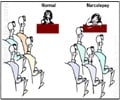Sleep Deprivation
Sleep deprivation is prevalent among 25% of the population and it leads to reduced cognitive abilities, tiredness, lack of energy, and weakness of muscles.
Sleep is a basic need of any individual and like hunger or thirst it needs to be fulfilled. Ignoring this need can lead to sleep deprivation. It afflicts almost one quarter of all adult population.
A person can be deprived of sleep due to some problem associated with the body or the mind, or as a consequence of some sleep disorder. Consequences of sleep deprivation on our health include-
- Sleep deprivation can disrupt the basic functioning capacity.
- Effects of sleep deprivation are as hazardous to health as alcohol. Getting less than 6 hours sleep in the night can affect coordination, judgment and reaction time.
- Besides impaired motor skills, people who get too little sleep may have higher levels of stress, anxiety and depression, and may take unnecessary risks.
- Diabetes, obesity and other medical problems have also been associated with sleep deprivation.
The effects of sleep loss begin to show up within 36hrs of sleep deprivation. Sleep deprivation has also been employed as a method of torture during wartime.














